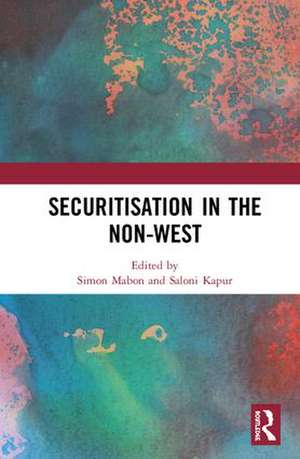Securitisation in the Non-West
Editat de Simon Mabon, Saloni Kapuren Limba Engleză Hardback – 11 sep 2018
The chapters in this book were originally published as a special issue of Global Discourse.
| Toate formatele și edițiile | Preț | Express |
|---|---|---|
| Paperback (1) | 383.93 lei 6-8 săpt. | |
| Taylor & Francis – 30 iun 2020 | 383.93 lei 6-8 săpt. | |
| Hardback (1) | 764.20 lei 6-8 săpt. | |
| Taylor & Francis – 11 sep 2018 | 764.20 lei 6-8 săpt. |
Preț: 764.20 lei
Preț vechi: 1102.79 lei
-31% Nou
Puncte Express: 1146
Preț estimativ în valută:
146.25€ • 158.80$ • 122.85£
146.25€ • 158.80$ • 122.85£
Carte tipărită la comandă
Livrare economică 22 aprilie-06 mai
Preluare comenzi: 021 569.72.76
Specificații
ISBN-13: 9781138314955
ISBN-10: 1138314951
Pagini: 170
Dimensiuni: 174 x 246 x 12 mm
Greutate: 0.45 kg
Ediția:1
Editura: Taylor & Francis
Colecția Routledge
Locul publicării:Oxford, United Kingdom
ISBN-10: 1138314951
Pagini: 170
Dimensiuni: 174 x 246 x 12 mm
Greutate: 0.45 kg
Ediția:1
Editura: Taylor & Francis
Colecția Routledge
Locul publicării:Oxford, United Kingdom
Public țintă
Postgraduate and UndergraduateCuprins
Introduction – The Copenhagen School goes global: securitisation in the Non-West 1. ‘It’s not a Muslim ban!’ Indirect speech acts and the securitisation of Islam in the United States post-9/11 2. Recursion or rejection? Securitization theory faces Islamist violence and foreign religions 3. Review of ‘Recursion or rejection? Securitization theory faces Islamist violence and foreign religions’, by Mona Kanwal Sheikh 4. Existential threats and regulating life: securitization in the contemporary Middle East 5. Review of ‘Existential threats and regulating life: securitization in the contemporary Middle East’, by Simon Mabon 6. From Copenhagen to Uri and across the Line of Control: India’s ‘surgical strikes’ as a case of securitisation in two acts 7. Securitization analysis beyond its power-critique 8 Securitization outside of the West: conceptualizing the securitization–neo-patrimonialism nexus in Africa 9. Securitization and the global politics of cybersecurity 10. The politics of securitized technology 11. Let’s just say we’d like to avoid any great power entanglements: desecuritization in post-Mao Chinese foreign policy towards major powers 12. China and discourses of desecuritization: a reply to Vuori 13. Securitization, mafias and violence in Brazil and Mexico 14. Sovereign implications of securitization work
Notă biografică
Simon Mabon is a Senior Lecturer in International Relations at Lancaster University, UK, Director of the Richardson Institute, UK, and a Research Associate at the Foreign Policy Centre, UK. He is the author of Saudi Arabia and Iran: Soft Power Rivalry in the Middle East (2013), co-author of Hezbollah: From Islamic Resistance to Government (2015), The Origins of ISIS (2016), and co-editor of Terrorism and Political Violence (2015), amongst a number of other publications pertaining to Middle Eastern politics and International Relations.
Saloni Kapur is currently a PhD candidate at Lancaster University, UK. Her work interrogates international society’s responsibility towards instability in Pakistan. She employs the English school’s concepts of great-power responsibility and regional society to conduct normative research on international counterterrorism cooperation, drawing on aesthetic sources and treating terrorists as social actors.
Saloni Kapur is currently a PhD candidate at Lancaster University, UK. Her work interrogates international society’s responsibility towards instability in Pakistan. She employs the English school’s concepts of great-power responsibility and regional society to conduct normative research on international counterterrorism cooperation, drawing on aesthetic sources and treating terrorists as social actors.
Descriere
This book looks at the broadening of the security agenda and framing of issues as existential threats and questions its application beyond the Western world. The chapters were originally published in a special issue of Global Discourse.
